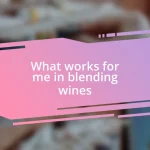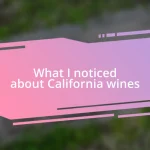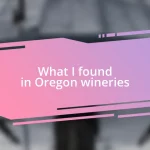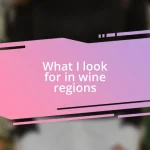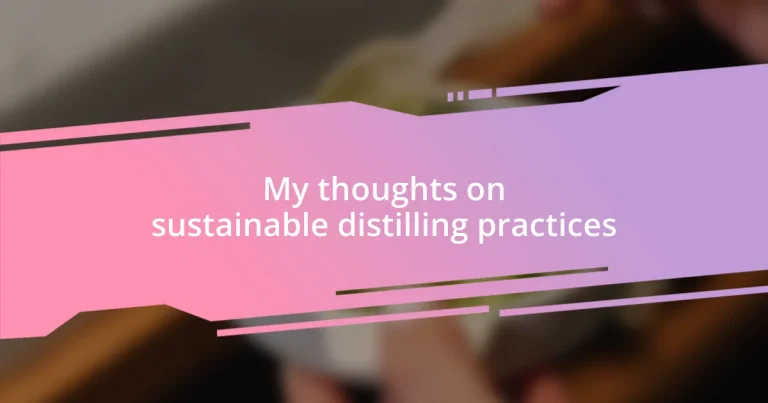Key takeaways:
- Sustainable distilling practices focus on resource conservation, ethical sourcing, and minimizing waste, enhancing both environmental impact and product quality.
- Innovations such as closed-loop systems, energy-efficient equipment, and collaboration with local farmers drive sustainability in the distilling industry.
- The future of sustainable distilling will likely feature increased transparency in production methods and the integration of advanced technology for optimizing resource use.
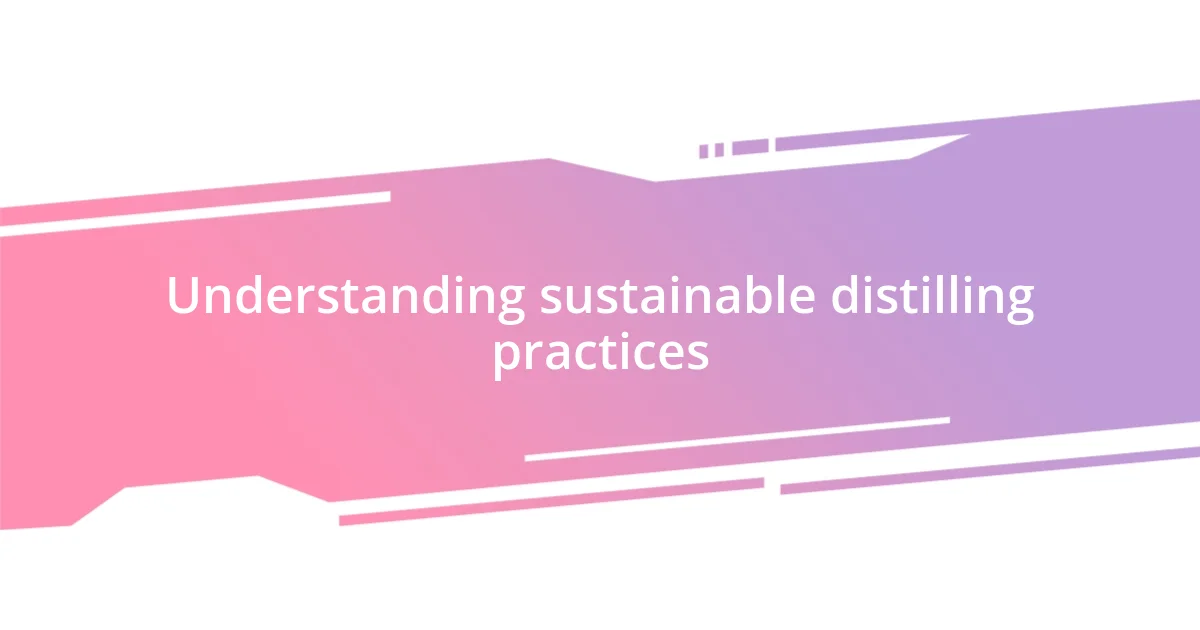
Understanding sustainable distilling practices
Sustainable distilling practices focus on reducing environmental impact while producing spirits. From my experience visiting various distilleries, I’ve seen firsthand how water conservation is vital. These facilities often implement closed-loop systems, which not only save water but also minimize waste—a practice I believe should be standard in the industry.
When I think about the ingredients, choosing local and organic sources has a profound effect on sustainability. Imagine the feeling of sipping a spirit knowing that the grains or botanicals were cultivated just down the road, supporting local farmers and reducing carbon footprints. It’s a win-win—environmentally friendly choices enhancing flavor profiles and community ties.
I’ve always been intrigued by the energy used in distillation. Many distilleries are turning to renewable energy sources, like solar or wind, to power their operations. Doesn’t it make you feel good to know that you’re supporting a brand that not only cares about their product but also the planet? When I encounter brands taking these extra steps, it ignites a passion in me to spread the word about their commitment to sustainability.
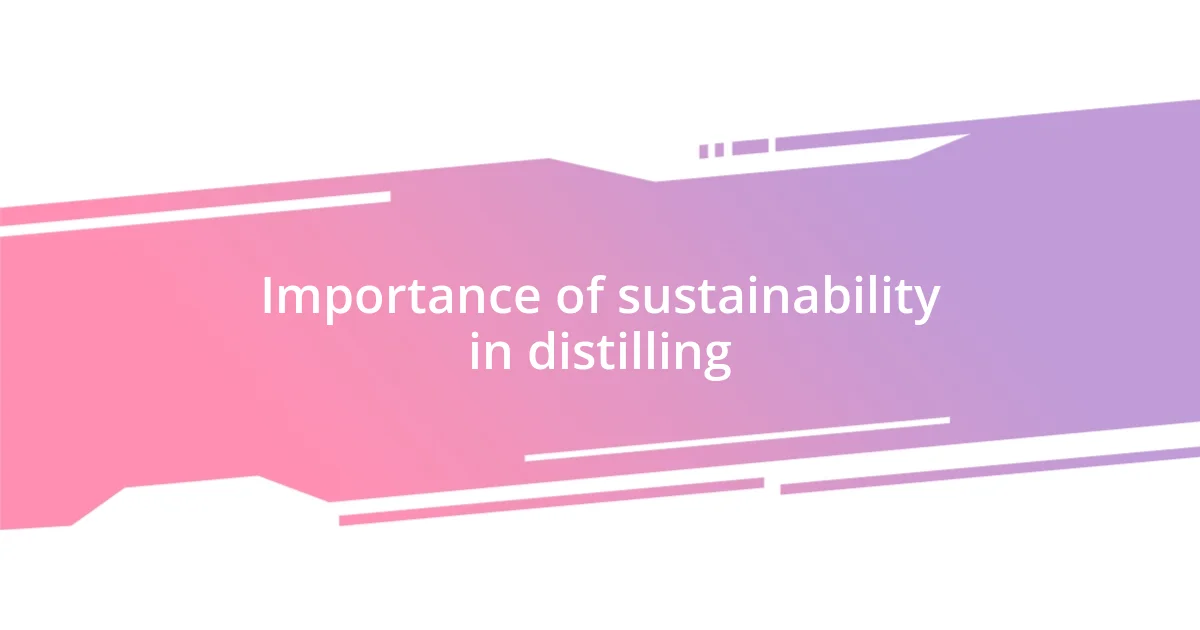
Importance of sustainability in distilling
The importance of sustainability in distilling cannot be overstated. Every decision a distillery makes has far-reaching effects on both the environment and the community. I remember visiting a small craft distillery that had converted its waste into biogas to power their operations. Witnessing this innovation was inspiring—it’s remarkable how creativity and responsibility can go hand in hand, ensuring the longevity of our planet while creating exceptional spirits.
Here are some critical reasons why sustainability matters in distilling:
- Resource Conservation: Efficient use of water and energy minimizes waste and maintains essential resources for future generations.
- Community Impact: Supporting local farmers and suppliers helps strengthen community ties, fostering local economies.
- Consumer Awareness: More consumers are prioritizing eco-friendly practices; distilleries adopting sustainable methods attract conscious buyers.
- Regulatory Compliance: Many regions are enforcing stricter environmental regulations; adhering to sustainable practices can ensure compliance and avoid penalties.
- Long-Term Viability: Sustainable operations not only promote environmental health but also enhance the distillery’s brand reputation and marketability over time.
In my experience, each of these factors creates a ripple effect that can transform the entire industry for the better. When distilleries embrace sustainability, it’s not just about keeping up with trends; it’s about showing a genuine respect for the planet and future generations.
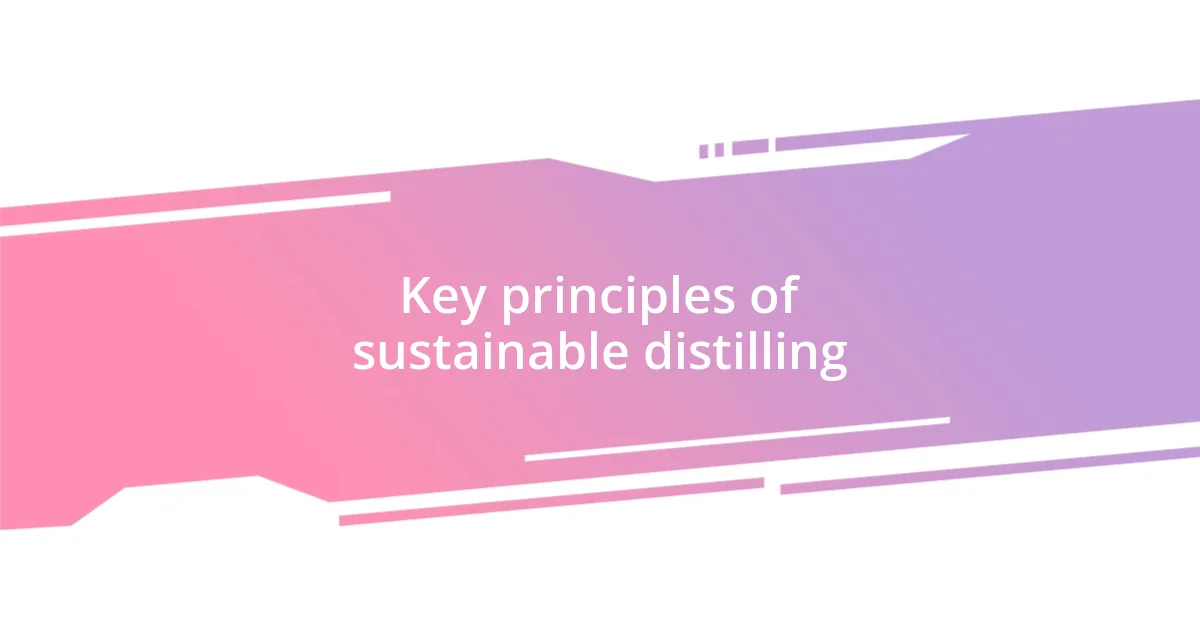
Key principles of sustainable distilling
Sustainable distilling encompasses several key principles that drive environmental stewardship within the industry. One vital aspect I’ve observed is the use of renewable resources. During a visit to a distillery that installed solar panels, I was struck by how they not only significantly reduced their energy costs but also inspired their community to consider renewable energy solutions. Watching them contribute positively to the environment while producing premium spirits opened my eyes to the tangible benefits of such practices.
Another principle I find crucial is minimizing waste by implementing innovative recycling methods. In one distillery, I saw them repurpose spent grains not only for animal feed but also for crafting unique products like snack bars. This creative approach resonated with me; it underscored the idea that sustainability isn’t just about what we consume, but also about how we can responsibly repurpose what we produce. It left me hopeful about the industry’s potential to evolve.
Furthermore, ethical sourcing of ingredients is paramount in sustainable distilling. I’ve personally tasted the difference when spirits use locally sourced botanicals—they tell a story of the land and its people. Engaging with distillers who prioritize organic farming practices connects me to the essence of the drinks I enjoy. It fosters a sense of community while advocating for ethical agriculture, which ultimately enhances the flavor and experience of every sip.
| Key Principle | Description |
|---|---|
| Renewable Resources | The use of energy from sustainable sources like solar or wind to reduce carbon footprints and operation costs. |
| Waste Minimization | Implementing waste recycling practices to repurpose byproducts, enhancing sustainability and efficiency. |
| Ethical Sourcing | Prioritizing local, organic ingredients that support community agriculture and enhance flavor profiles. |
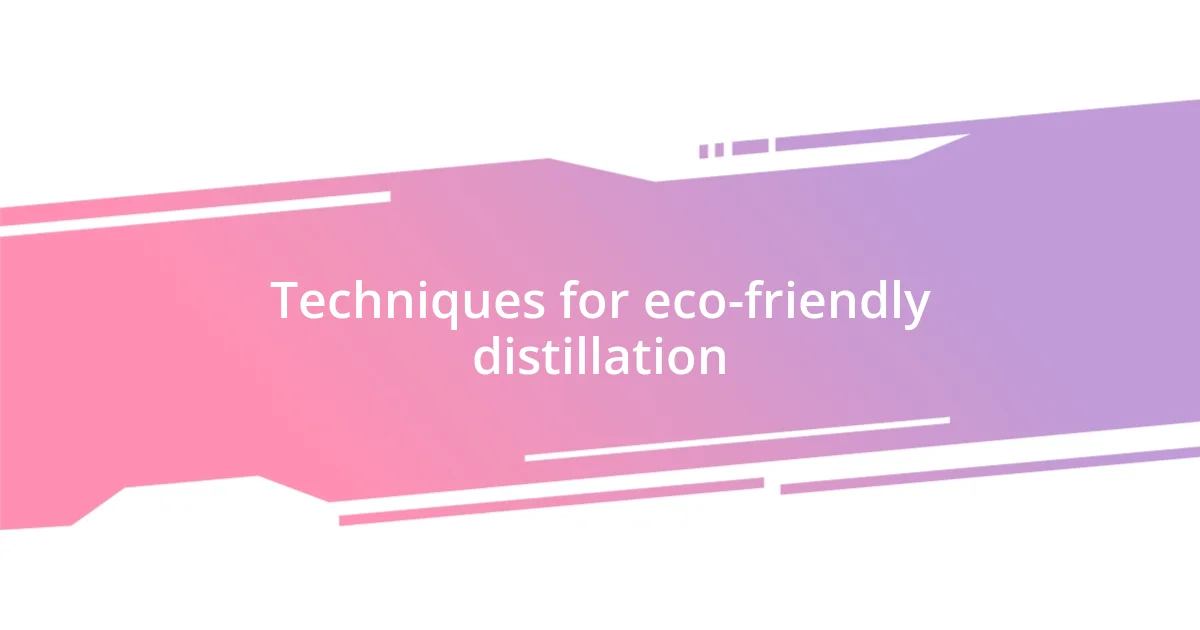
Techniques for eco-friendly distillation
In eco-friendly distillation, one major technique I’ve come to appreciate is the use of closed-loop systems. These systems recapture vapor and reduce water usage significantly. While visiting a distillery that employed this technique, I was amazed to see how they transformed their water management—what once was a burden became a resource. Isn’t it fascinating how innovation can turn potential waste into usable materials?
Another technique worth mentioning is the integration of energy-efficient equipment. I remember witnessing the installation of energy-saving stills that not only decreased electricity consumption but also improved the distillation process. It made me wonder: how many distilleries could drastically cut down their environmental impact with the right investments? Personally, I feel that every small step towards energy efficiency adds up to a more sustainable industry overall.
I’ve also observed the trend of incorporating bioremediation strategies within distilleries. During my time at a facility that cultivated plants to purify wastewater naturally, I couldn’t help but feel a sense of excitement. It’s remarkable how nature can lend us solutions, don’t you think? This approach not only aids in cleaning the water but also promotes biodiversity around the distillery. It’s these connections to the environment that make me optimistic about the future of distilling practices.
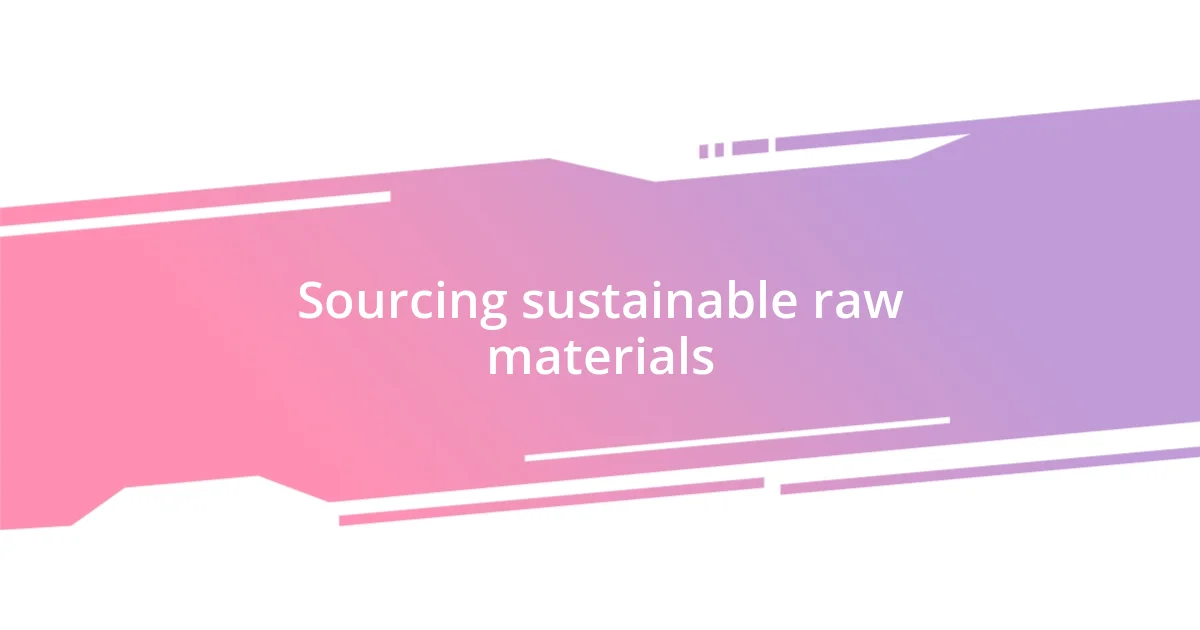
Sourcing sustainable raw materials
When it comes to sourcing sustainable raw materials, I find that the story behind each ingredient is as important as the flavor it brings to the final product. I recall a conversation with a farmer who grows organic herbs for a local distillery. He shared how sustainable practices improved not just the yield, but also the soil quality. It struck me—what if more distillers took the time to know their suppliers and understand the farming methods behind their ingredients? This connection cultivates respect and sustainability in a way that mass-produced spirits can never replicate.
I’ve noticed that when distilleries choose to work with local farmers, it creates a ripple effect in the community. For instance, at a distillery that prioritizes regional ingredients, I experienced a tasting where every sip told me something about the local terroir. I was genuinely moved by how these spirits mirrored the land and the hard work of those who tended it. Isn’t it rewarding to support businesses that rejuvenate the local economy while celebrating the essence of their surroundings?
Moreover, sustainability in sourcing requires a commitment to ethical practices. I once visited a distillery that sourced its grains from a cooperative emphasizing permaculture. They explained how this method not only conserved water but also attracted diverse wildlife back to the fields. It made me wonder—if every distillery embraced such practices, just how expansive would the positive environmental impact be? This understanding reinforces my belief that sourcing sustainably isn’t merely a trend; it should be the foundation of distilling.
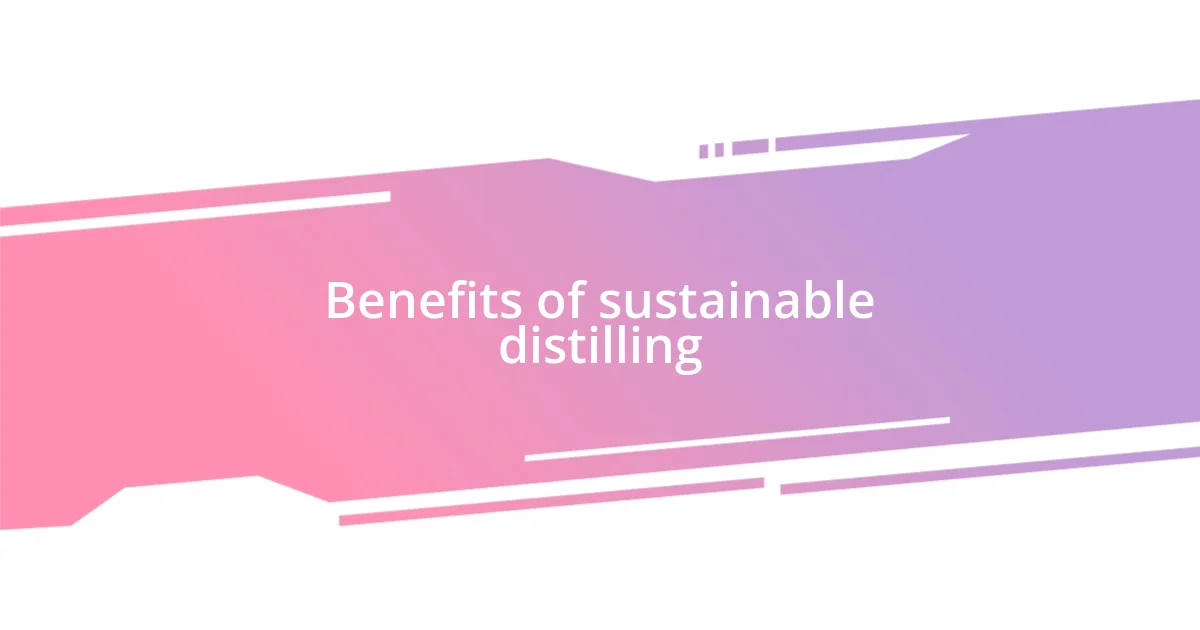
Benefits of sustainable distilling
Sustainable distilling comes with a plethora of benefits that ripple through the entire production process. One of the most immediate perks I’ve observed is the enhancement of product quality. When distilleries focus on sustainable practices, they often prioritize ingredient quality, which resonates in the final product. I’ll never forget tasting a whiskey that was crafted using organic grains; the depth of flavor was striking. It felt remarkable that responsible sourcing could yield such an exquisite taste. Isn’t it amazing how sustainability and quality can go hand in hand?
Another significant advantage involves cost savings over time. By investing in energy-efficient equipment, distillers can substantially lower their utility bills. I recall a case where a distillery reported savings of up to 30% on their energy costs after upgrading their distillation apparatus. My initial thought was, why wouldn’t every distillery leap at the chance for such savings? It’s a win-win: reduce their environmental footprint and enhance their bottom line at the same time.
Lastly, there’s the compelling story of community engagement that often grows from sustainable distilling practices. I remember visiting a craft distillery that opened its doors for workshops, teaching locals about eco-friendly distillation methods. It created an emotional bond between the distillery and the community. Engaging with people and sharing knowledge cultivates a sense of collective effort toward preserving the environment. How much stronger could this connection become if more distilleries made sustainability a cornerstone of their mission? It’s this synergy between business and community that fills me with hope for a vibrant, sustainable future in the distilling industry.
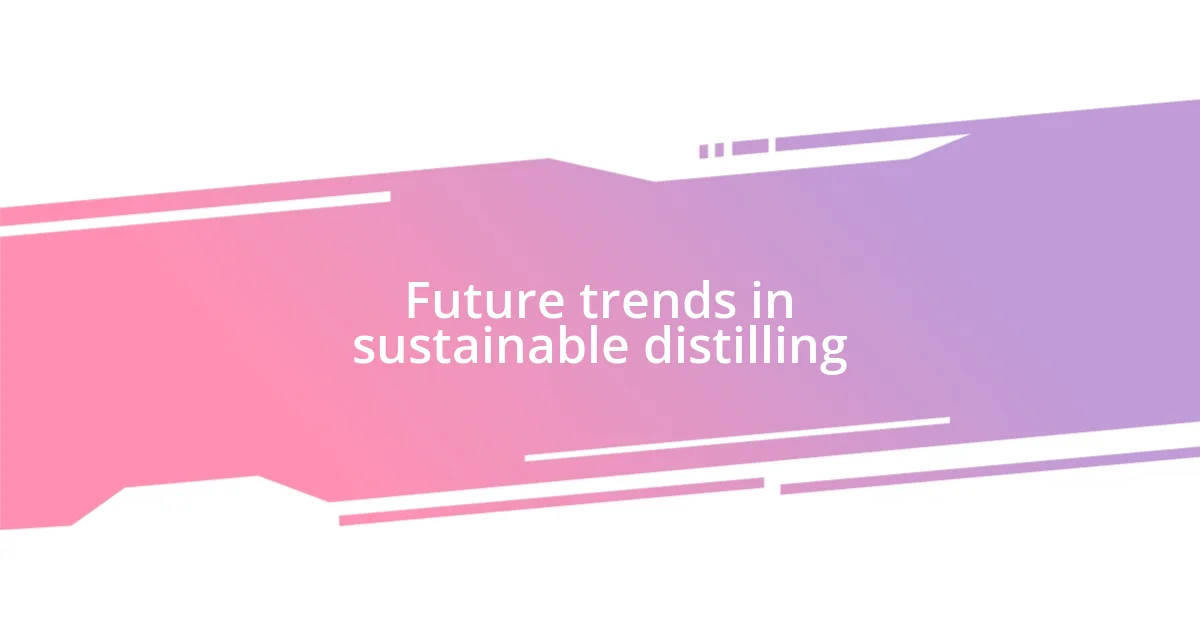
Future trends in sustainable distilling
The future of sustainable distilling is exciting as innovation takes center stage. I recently chatted with a distiller who experimented with using waste materials from other industries—like grape pomace from wineries—in their spirits. It was fascinating to see how this practice not only minimized waste but also introduced unique flavor profiles to their offerings. What if more distillers began to explore the potential of such collaborations? I can only imagine the creativity that could emerge.
As I look ahead, I can’t help but think about the growing movement towards transparency in production methods. Some distilleries are starting to share detailed reports of their processes online, allowing consumers to trace ingredients back to their sources. I remember visiting a brand that showcased its journey from farm to bottle, making me appreciate the hard work behind my drink even more. Wouldn’t it be incredible if this trend became the norm, empowering consumers to make informed choices?
Lastly, I anticipate that technology will play a pivotal role in sustainable practices. I’ve seen the rise of smart distilling systems that optimize energy use and reduce water waste, and it’s impressive. During a distillery tour, I noticed how data analytics helped them adjust their processes in real-time, minimizing their environmental footprint. How much further could the industry go as technology advances? The possibilities seem endless, fueling my excitement for a greener future in the world of distilling.


